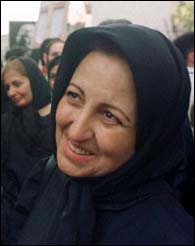 The Norwegian Nobel Committee has decided to award the Nobel Peace Prize for 2003 to Shirin Ebadi for her efforts for democracy and human rights. She has focused especially on the struggle for the rights of women and children.
The Norwegian Nobel Committee has decided to award the Nobel Peace Prize for 2003 to Shirin Ebadi for her efforts for democracy and human rights. She has focused especially on the struggle for the rights of women and children.As a lawyer, judge, lecturer, writer and activist, she has spoken out clearly and strongly in her country, Iran, and far beyond its borders. She has stood up as a sound professional, a courageous person, and has never heeded the threats to her own safety. Her principal arena is the struggle for basic human rights, and no society deserves to be labelled civilized unless the rights of women and children are respected. In an era of violence, she has consistently supported non-violence. It is fundamental to her view that the supreme political power in a community must be built on democratic elections. She favours enlightenment and dialogue as the best path to changing attitudes and resolving conflict. Ebadi is a conscious Moslem. She sees no conflict between Islam and fundamental human rights. It is important to her that the dialogue between the different cultures and religions of the world should take as its point of departure their shared values. It is a pleasure for the Norwegian Nobel Committee to award the Peace Prize to a woman who is part of the Moslem world, and of whom that world can be proud - along with all who fight for human rights wherever they live. During recent decades, democracy and human rights have advanced in various parts of the world. By its awards of the Nobel Peace Prize, the Norwegian Nobel Committee has attempted to speed up this process. We hope that the people of Iran will feel joyous that for the first time in history one of their citizens has been awarded the Nobel Peace Prize, and we hope the Prize will be an inspiration for all those who struggle for human rights and democracy in her country, in the Moslem world, and in all countries where the fight for human rights needs inspiration and support. Norwegian Nobel Institute Drammensveien 19, N-0255 Oslo, Norway Website: www.nobel.no Links will be opened in new window. Biography of Shirin Ebadi, 2003's Laureate |
|
BOES.ORG International Campaign to Ban Landmines (ICBL) ICBL NGO-links |
Laureates 2004: Wangari Maathai. For her contribution to sustainable development, democracy and peace. She thinks globally and acts locally. 2003: Shirin Ebadi, Iran, 1947-. Lawyer and human rights activist, for her efforts for democracy and human rights. She has focused especially on the struggle for the rights of women and children. 2002: Jimmy Carter, USA, 1924-. For his decades of untiring effort to find peaceful solutions to international conflicts. 2001: The prize was divided equally between: The United Nations ( U.N.) and its Secretary-General, Kofi Annan, Ghana, 1938- For their work for a better organized and more peaceful world. 2000: Kim Dae Jung, Republic of Korea, 1925-. For his work for democracy and human rights in South Korea and in East Asia in general, and for peace and reconciliation with North Korea in particular. 1999: Doctors Without Borders (Médecins Sans Frontières) In recognition of the organisation's pioneering humanitarian work on several continents. 1998: The prize was divided equally between: John Hume, Northern Ireland, 1937-; and David Trimble, Northern Ireland, 1944-. For their efforts to find a peaceful solution to the conflict in Northern Ireland. 1997: The prize was divided equally between: International Campaign to Ban Landmines (ICBL) and Jody Williams, USA, 1950-. 1979: Mother Teresa, India, 1914-1997. Leader of the Order of the Missionaries of Charity. |
|
|